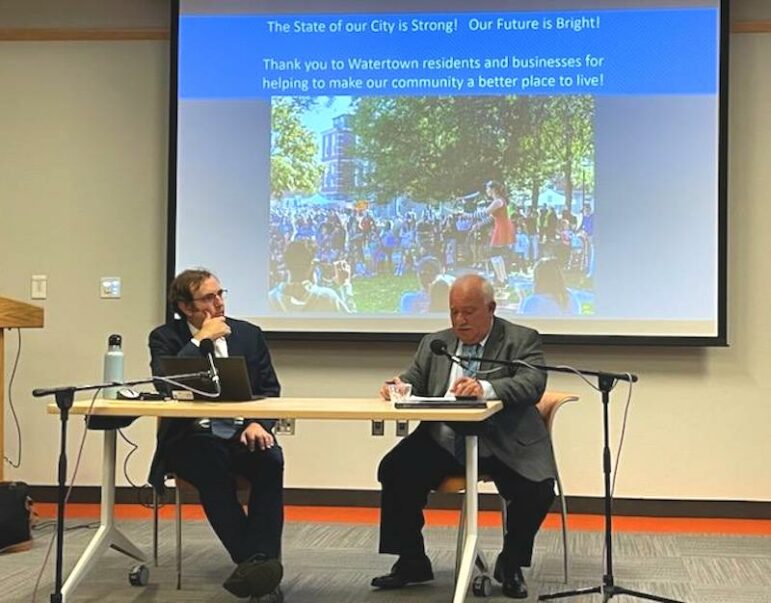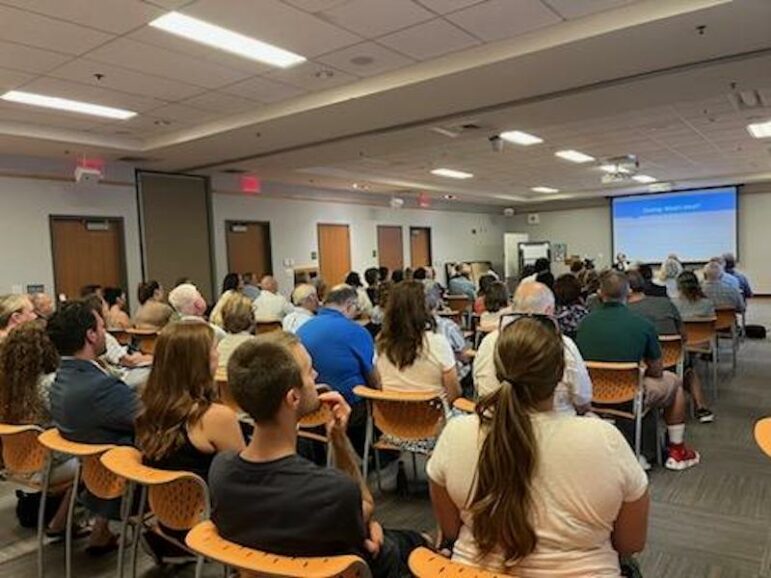
The State of the City of Watertown is strong and the future is bright, City Manager George Proakis said during the first annual State of the City on Wednesday night, but there are still many challenges to deal with.
The event where the City Manager and the City Council President talk about how the City of Watertown is doing is now required to be held annually, following the changes to Watertown’s City Charter adopted in 2021. At the end of his presentation, Proakis included a photo of a performer at the Faire on the Square.
“I do feel sometimes like what this woman is doing — juggling knives — is sort of what the job is like working in local government,” Proaksis said. “But, nevertheless it’s part of the fun.”
Some of the highlights during his first year on the job have been the city’s current financial situation, the school building projects, and planning for the future of Watertown Square. The challenges include budgets in future years, reorganizing the city government, and dealing with the housing crunch.
Financial Outlook
Proakis said Watertown’s city budget is strong, and the commitment to funding capital projects, paying down the pension deficit, and having the financial flexibility to take on major projects and purchases without going to the taxpayers for overrides to pay for projects such as the new schools.
“It’s tough to discuss fiscal stability without discussing (former Manager Michael) Driscoll and the work that he did with this Council over many years,” Proakis said.
He added that Watertown is one of only four in the state that have met the state requirement to fully fund the municipal pension program, along with Leominster, Shrewsbury, and Quincy. City Council President Mark Sideris said some communities are 20 to 30 years from fully funding their pensions. Watertown will also fully fund the other post-employment benefits (OPEB), such as healthcare, in seven years, Proakis said. This is not a state requirement, but he said it is also an area which can become problematic.
When Proakis arrived in Watertown he was pleased to see that the City not only has a robust capital improvement plan, but follows through on funding and carrying out the improvement projects at City buildings and properties, as well as purchasing vehicles and equipment.
The fiscal stability has also allowed Watertown to build two new elementary schools, renovate and expand a third, and plan construction of a new high school (with the help of state reimbursement) without raising taxes with a debt exclusion override.
The financial picture in the next few years, however, is not as certain. Proakis said that the taxes from newly-constructed projects will likely take a dip due to cooling of the life science market. At the same time, the City will have the highest interest payments on the borrowing for the high school project in 2026 and 2027.
“We have been very careful with that so don’t make projections for 2026, 2027, and 2028 that are based on a numbers which are completely based on a project that might happen, should happen, could happen, but that I can’t necessarily promise will happen based upon the life science economy,” Proakis said, adding that the projections for those years are based on projects that have already started construction.
Planning for the Future
Watertown has had a number of planning efforts before he arrived, Proakis said, and the City is about to approve an update to the Comprehensive Plan. There are also other efforts on the horizon.
“It is always a good idea to have a plan, build on that plan, to look back at it every five years, because … things change that you don’t anticipate and a lot of things change that you can’t control,” Proakis said. “The community changes whether you plan for it or not. The advantage of having that plan is we can mold, shape and grow the community in the direction that we want to, as opposed to just letting things happen for us.”

The shaping of the community will soon focus on Watertown Square. Proakis told the audience at the Watertown Free Public Library that the City is negotiating a contract with Utile, a planning consultant, to do a study of the center of Watertown. Included in the team is Speck and Associates, led by Jeff Speck, who has worked to make cities more inviting and walkable. Proakis added that the process will include multiple opportunities for residents to participate.
The planning will include not just the intersection, which will be a major focus, but also go a significant way down the spokes off the Square, Proakis said. The planning will also include public transportation and addressing the challenges of the MBTA Communities Law, requiring communities to zone areas for multi-unit housing as right near transportation hubs.
The MBTA law is aimed at creating more housing, which the Healey-Driscoll Administration has made a priority. Proakis was asked about whether the property on Galen Street owned by the MBTA, known as Watertown Yard, could be used for more housing. He said he recently attended a meeting with the new MBTA General Manager Phillip Eng and brought up the question of using the property, which includes the bus turnaround as well as a garage. Sideris called it the most underutilized property in Watertown.
“The Watertown Square plan needs the MTBA to be at the table to be successful for two reasons,” Proakis said. “First it affects the operation of their system no matter how we do work on the intersections. Second, they are one of the key landholders in the area, and honestly one the best pieces of property in the area: waterfront views and a beautiful location.”
He asked Eng whether the MBTA can partner with the City to revamp the property and create housing. Proakis said that it makes sense because “the MBTA wants ridership and the governor is actively pushing for transportation oriented development, while the transit operator itself is sitting on an underutilized real estate in one of its hubs.”
Green Efforts, High School Project
Another of Watertown’s successes pointed to by Proakis is the sustainability and energy efficiency efforts. The same month he arrived, August 2022, the City Council approved the Watertown Climate and Energy Plan. The goals include cutting the use of fossil fuels and increasing energy efficiency for not just municipal buildings and vehicles but for residents and businesses as well. One step toward that goal was adopting the state’s Specialized Stretch Energy Code, which the Council approved in January.
“We were the first in the state to do that,” Proakis said. “I am very proud we are the first to do it.”
The construction of two net-zero energy elementary schools and a net-zero energy high school make Watertown a leader, Proakis said.
Sideris said that word has spread about Watertown’s new schools.
“I hear from people now coming back into the community, moving into the community because they hear about how good the schools are. It is not just about the buildings. It is about the teachers and the staff as well,” Sideris said. “I remember years ago that that wasn’t a reputation that Watertown had. Watertown wasn’t on the top of anybody’s list of places for people to come to because of the schools.”
Proakis said a benefit of the net zero schools is that there will be no utility bills, since enough energy is created on site to power the building. However, since the school was approved, the cost of construction has skyrocketed. The state agreed to reimburse about $360 per square foot. Since then, the reimbursement rate has gone up to about $460 per square foot, but that rate is locked in when the design begins. Sideris noted that the design of the new Watertown High School began before the pandemic.
Watertown faces a shortfall of about $17 million due to the construction cost increases, Proakis said. The State Budget, approved by the Legislature at the end of July, includes $5 million to help make up the shortfall.
Changing Government
Proakis has started reorganizing the municipal government, and has added some positions, including Deputy City Manager, Emily Monea.
Another area that the City will be hiring for is for the newly created Constituent Services Department. For many years, the City Council has been discussing how to improve how well the City responds to resident concerns and questions, Sideris said, and the Council decided that a one-stop program should be created. It is known as a 311 system.
“We want to make one single place where people can call, email or connect with that will process request for work and answer questions of community members, and get it done in way that is accurate, courteous and easy, so people know where to go to get information that’s accurate,” Proakis said.
Another project coming up is looking at what steps the City can take to address challenges in the community such as housing, food insecurity, healthcare, substance use disorder, and more.
“It’s a very interesting and complex question, what role local government plays in those items on that list, what role we can play, and what role we should play,” Proakis said.
The City will conduct a Health and Human Services Study, looking at some of the key departments addressing those issues, such as the Senior Services, Veterans and Health departments, and the outsourced programs with Wayside Multi-Service Center.
Sideris said the Council has discussed ways to address these issues for several years.
“There is a lot going on there. I will say this is an area that has been a critical piece to the City Council to try to meet the needs of this community,” Sideris said. “As George has said, the community has changed, needs have changed. We want to get a study to see where we are lacking, what we need, where we can potentially fund things in the future. I think this is one of the more important studies we are engaged in right now.”
(Watch the replay of the State of the City on Watertown Cable. http://vodwcatv.org/CablecastPublicSite/show/2695?site=1)
Thank you so much Charlie for the detailed summary of the first ‘State of
the City’ presentation. Your web-based Water News has become essential
reading for me.
I tried very hard to view that meeting using Zoom, but totally failed for reasons I cannot imagine.
Somehow we need to prod Watertown Bank to install a real AV system that
includes Functional Zoom and good audio at the rear of the room.
Robert, You can watch the replay of the State of the City on Watertown Cable. http://vodwcatv.org/CablecastPublicSite/show/2695?site=1
Hey, Robert — As Charlie said, there’s a replay link to Watertown’s inaugural State of the City address on Watertown Cable, which also includes captions.
Have a wonderful weekend!